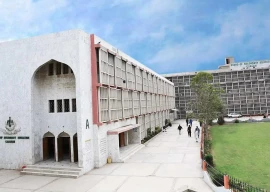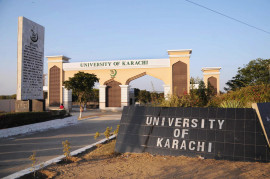
“It has to begin by changing the mindset and attitudes of the personnel and the outmoded laws, which shape their traits,” said Prof Muhammad Akmal Wasim, a law teacher at the Hamdard School of Law.

Prof Wasim was giving a presentation on a draft of the Sindh Police Act, 2014, at a discussion forum at Indus Hotel on Wednesday. The event was organised by a non-profit organisation, Rozan, which is working along with a dozen other NGOs under the aegis of the Pakistan Forum on Democratic Policing (PFDP). The PFDP prepared the draft and is also lobbying with the provincial governments for an amendment.
The law teacher contended that the existing law makes policemen feel that the common people are their subjects, rather than taxpayers entitled to policing services. “The first step is to declare the police as a service.”
He said the antiquated Police Act, 1861, was part of the manoeuvres of the then British rulers to colonise the Indian people. “I would advise people to stop blaming the police as it is the outdated act that is the root of the problem.”
Prof Wasim also referred to a communication gap between citizens and the police. The draft proposes the establishment of district and provincial police oversight committees that will consist of 11 members, including MPAs, the president of the district bar association, and the district police head. The 11-member provincial committee will include the chief minister, the law minister, MPAs, the provincial chief secretary and the IG.
The committee will be tasked to ‘redress grievances against the police, point out shortcomings regarding infrastructure and equipment for the police and promote citizens-police cooperation’. “The concept of the citizen-police liaison should be devolved to the level of a locality from the existing model of the district-based Citizens-Police Liaison Committee (CPLC),” suggested Prof Wasim. According to his proposition, the CPLCs should work as voluntary, autonomous and self-sustaining bodies of prominent citizens.
“Peer review has often failed as an effective tool of accountability,” said the professor. “Therefore, external oversight is necessary to ensure that the police provide due services and stay away from corruption.”
The draft also calls for setting up a criminal justice committee to monitor dispensation of justice and recommend improvements.
The separation of investigation and prosecution wings of the police is also advocated in the draft on the lines of Police Order, 2002, which also suggests a 30 per cent quota for women in all appointments to improve gender parity.
Muttahida Qaumi Movement MPA Sabir Kaimkhani while highlighting the need for reforms through legislation pointed out the political influence that continues to affect the police performance. The MPA said that his party supports segregation of investigation and operation responsibilities.
Pakistan Tehreek-e-Insaf MPA Syed Hafeezuddin lamented that no meaningful police reforms have been introduced in the 67 years of the country’s existence. “The government spends money on the police but accountability of funds, implications of the use of unbridled power, torture of the weak, manipulation in prosecution and many other wrongdoings are never checked.”
Ilahi Bux Baloch, an executive of the Strengthening Participatory Organisation NGO, which is part of the PFDP, said that only commissioned police officers should be posted at police stations. According to him, the officers promoted from the ranks of constables lack the qualification, professional capacity and the attitude required to be a station head.
Published in The Express Tribune, June 20th, 2014.

















COMMENTS
Comments are moderated and generally will be posted if they are on-topic and not abusive.
For more information, please see our Comments FAQ